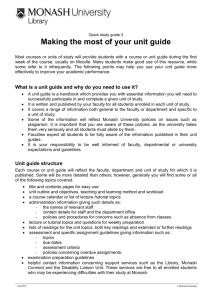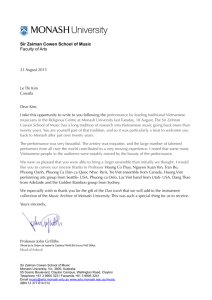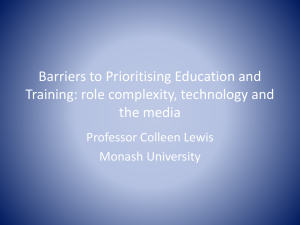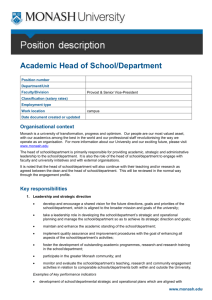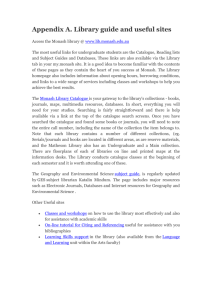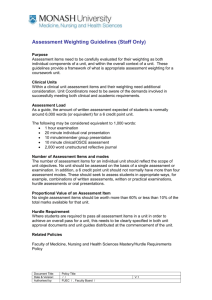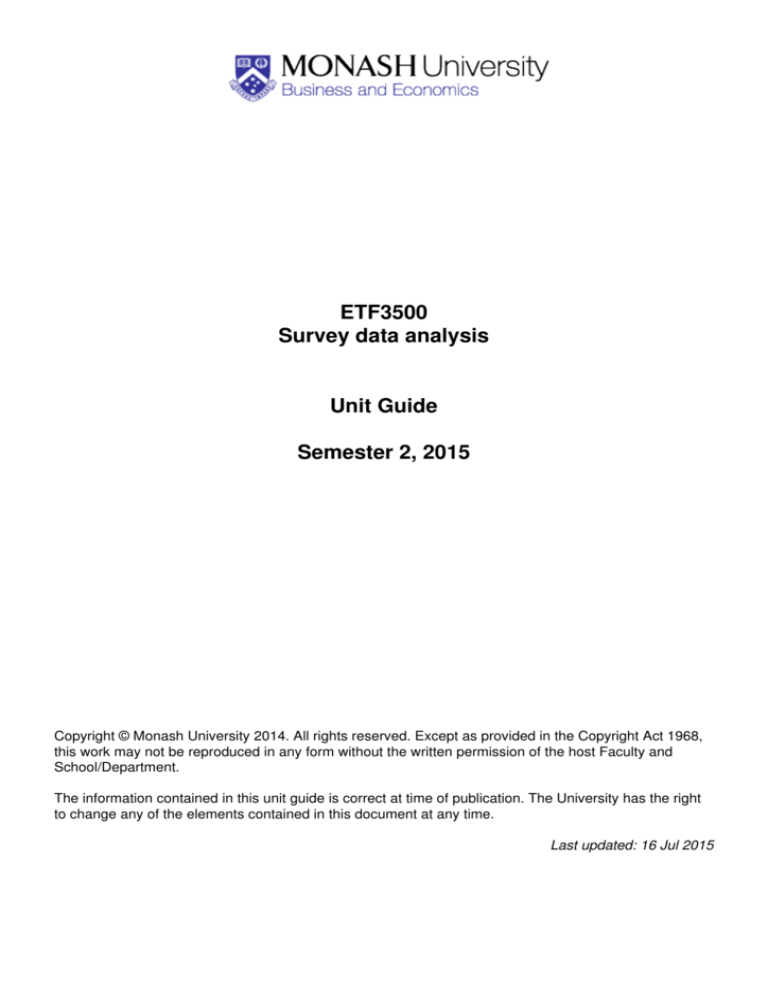
ETF3500
Survey data analysis
Unit Guide
Semester 2, 2015
Copyright © Monash University 2014. All rights reserved. Except as provided in the Copyright Act 1968,
this work may not be reproduced in any form without the written permission of the host Faculty and
School/Department.
The information contained in this unit guide is correct at time of publication. The University has the right
to change any of the elements contained in this document at any time.
Last updated: 16 Jul 2015
Table of Contents
ETF3500 Survey data analysis - Semester 2, 2015.................................................................................1
Mode of Delivery..............................................................................................................................1
Workload requirements....................................................................................................................1
Unit Relationships............................................................................................................................1
Prerequisites........................................................................................................................1
Prohibitions..........................................................................................................................1
Chief Examiner(s)........................................................................................................................................1
Campus Lecturer(s).....................................................................................................................................1
Caulfield...........................................................................................................................................1
Tutor(s)........................................................................................................................................................2
Caulfield...........................................................................................................................................2
Your feedback to Us....................................................................................................................................2
Previous Student Evaluations of this Unit....................................................................................................2
Academic Overview...................................................................................................................................3
Learning Outcomes.........................................................................................................................3
Unit Schedule.............................................................................................................................................4
Teaching Approach..........................................................................................................................4
Assessment Summary.....................................................................................................................5
Second marking...................................................................................................................5
Return of final marks............................................................................................................5
Assessment criteria..............................................................................................................5
Assessment Requirements......................................................................................................................6
Assessment Tasks...........................................................................................................................6
Assessment task 1...............................................................................................................6
Assessment task 2...............................................................................................................6
Examination(s).............................................................................................................................................6
Examination 1..................................................................................................................................6
Learning resources......................................................................................................................................7
Feedback to you..........................................................................................................................................7
Assignment submission...............................................................................................................................7
Online submission...........................................................................................................................7
Other Information......................................................................................................................................8
Policies............................................................................................................................................8
Graduate Attributes Policy...................................................................................................8
Student Charter...........................................................................................................................................8
Student services..........................................................................................................................................8
Monash University Library...........................................................................................................................8
Moodle 2......................................................................................................................................................9
Disability Liaison Unit..................................................................................................................................9
ETF3500 Survey data analysis - Semester 2, 2015
This unit adopts a very practical approach to introducing multivariate statistical techniques that are
currently popular in the analysis of business survey data. The main topics to be covered are: a review of
statistical tools, factor analysis, structural equation modelling, cluster analysis, discriminant analysis,
correspondence analysis and multivariate analysis of variance. SPSS software will be used for problem
solving. The emphasis will be on understanding, interpreting and reporting results of the analysis and on
the proper use of techniques. Case studies drawn from business will be discussed.
Mode of Delivery
Caulfield (Day)
Workload requirements
Minimum total expected workload to achieve the learning outcomes for this unit is 144 hours per
semester typically comprising a mixture of scheduled learning activities and independent study.
Independent study may include associated readings, assessment and preparation for scheduled
activities. The unit requires on average three/four hours of scheduled activities per week. Scheduled
activities may include a combination of teacher directed learning, peer directed learning and online
engagement.
See also Unit timetable information
Unit Relationships
Prerequisites
ETF2100 or ETX2111 or ETX2121 or MKF2121
Prohibitions
ETC3500, MKC3500 and MKF3500
Chief Examiner(s)
Dr Anastasios Panagiotelis
Campus Lecturer(s)
Caulfield
Dr Anastasios Panagiotelis
Campus: Clayton
Phone: +61 3 990 34157
Email: Anastasios.Panagiotelis@monash.edu
Contact hours: Tue 1PM-2PM (Caulfield, H.67) Thu 2PM-3PM (Clayton, E755) or by appointment
1
ETF3500 Survey data analysis - Semester 2, 2015
Tutor(s)
Caulfield
Mr Lachlan Macquarie
Campus: Clayton
Phone: +61 3 990 55841
Email: Lachlan.Macquarie@monash.edu
Contact hours: Wed 10-12 (Room H4.64)
Your feedback to Us
Monash is committed to excellence in education and regularly seeks feedback from students, employers
and staff. One of the key formal ways students have to provide feedback is through the Student
Evaluation of Teaching and Units (SETU) survey. The University’s student evaluation policy requires that
every unit is evaluated each year. Students are strongly encouraged to complete the surveys. The
feedback is anonymous and provides the Faculty with evidence of aspects that students are satisfied
and areas for improvement.
For more information on Monash’s educational strategy, see:
www.monash.edu.au/about/monash-directions/ and on student evaluations, see:
www.policy.monash.edu/policy-bank/academic/education/quality/student-evaluation-policy.html
Previous Student Evaluations of this Unit
If you wish to view how previous students rated this unit, please go to
https://emuapps.monash.edu.au/unitevaluations/index.jsp
2
Academic Overview
Learning Outcomes
The learning goals associated with this unit are to:
1. demonstrate an understanding of the role that multivariate statistical techniques such as factor
analysis, structural equation modelling, logistic regression, categorical data analysis, cluster
analysis, multidimensional scaling and correspondence analysis, play in uncovering relationships
and patterns in survey data
2. appraise the strengths and limitations of these techniques
3. apply tools in SPSS to generate solutions for the appropriate statistical techniques
4. demonstrate skills in using the appropriate statistical techniques from a user and provider
perspective
5. demonstrate skills in communicating the results of the analysis so that decision making can be
implemented.
3
Unit Schedule
Week
Activities
0
Assessment
No formal assessment or activities are
undertaken in week 0
1
Lecture: Introduction; Preliminary Data Analysis.
Tutorial: No Tutorial first week.
2
Lecture: Cluster Analysis, Tutorial: Preliminary Data
Analysis
3
Lecture: ANOVA/ MANOVA, Tutorial: Cluster Analysis
4
Lecture: Discriminant Analysis, Tutorial: ANOVA/
MANOVA
5
Lecture: Principal Components Analysis, Tutorial:
Discriminant Analysis
6
Lecture: Correspondence Analysis, Tutorial, Principal
Components Analysis
7
Lecture: Multidimensional Scaling, Tutorial:
Correspondence Analysis
8
Lecture: Regression Modelling, Tutorial:
Multidimensional Scaling
9
Lecture: Exploratory Factor Analysis, Tutorial:
Regression Modeliing
10
Lecture: Confirmatory Factor Analysis, Tutorial:
Exploratory Factor Analysis
11
Lecture: Structural Equation Modelling 1, Tutorial:
Confirmatory Factor Analysis
12
Lecture: Structural Equation Modelling 2, Tutorial:
Structural Equation Modelling 1
Assignment 2 Due
SWOT VAC
No formal assessment is undertaken
SWOT VAC
Examination period
LINK to Assessment Policy:
http://policy.monash.edu.au/policy-bank/
academic/education/assessment/
assessment-in-coursework-policy.html
Assignment 1 due
Teaching Approach
• Lecture and tutorials or problem classes
This teaching and learning approach provides facilitated learning, practical exploration and peer
learning.
• Laboratory-based classes
This teaching approach is practical learning.
4
Unit Schedule
Assessment Summary
Within semester assessment: 50%
Examination: 50%
Assessment Task Value
Due Date
Assignment 1
20%
25th September
Assignment 2
30%
23rd October
Examination 1
50%
To be advised
Second marking
Where an assessment task is given a fail grade by an examiner, that piece of work will be marked again
by a second examiner who will independently evaluate the work, and consult with the first marker. No
student will be awarded a fail grade for an assessment task or unit without a second examiner confirming
the result.
Note: Exceptions to this are individual pieces of assessment contributing 10% or less of the final mark,
unless the total of such pieces exceeds 30% of the final mark.
Return of final marks
Faculty policy states that 'the final mark that a student receives for a unit will be determined by the Board
of Examiners on the recommendation of the Chief Examiner taking into account all aspects of
assessment'.
The final mark for this unit will be released by the Board of Examiners on the date nominated in the
Faculty Calendar. Student results will be accessible through the my.monash portal.
Assessment criteria
Assessment Criteria Grading Descriptors available at:
http://www.policy.monash.edu/policy-bank/academic/education/assessment/
5
Assessment Requirements
Assessment Tasks
•
Assessment task 1
Title:
Assignment 1
Due date:
25th September
Details of task:
The assessment task is designed to test your achivement of Objectives 1-5. The
assignment will comprise questions on tasks that include using SPSS to generate output
and interpreting the results.
Weighting/Value:
20%
Estimated return date:
Marks will be returned in a tutorial.
•
Assessment task 2
Title:
Assignment 2
Due date:
23rd October
Details of task:
Assignment 2 is the analysis of survey data using a variety of appropriate multivariate
analysis techniques. This assessment task is designed to test your achievment of
objectives 1-5. The Assignment will comprise questions on tasks that include using SPSS
to generate output and interpreting the results.
Weighting/Value:
30%
Estimated return date:
Examination(s)
• Examination 1
Weighting:
50%
Length:
2 hours
Type (open/closed book):
Closed book
Electronic devices allowed in the exam:
Any calculator
6
Assessment Requirements
Learning resources
Monash Library Unit Reading List (if applicable to the unit)
http://readinglists.lib.monash.edu/index.html
Feedback to you
Types of feedback you can expect to receive in this unit are:
• Informal feedback on progress in labs/tutes
• Graded assignments with comments
Assignment submission
Online submission
If Electronic Submission has been approved for your unit, please submit your work via the VLE site for
this unit, which you can access via links in the my.monash portal.
7
Other Information
Policies
Monash has educational policies, procedures and guidelines, which are designed to ensure that staff and
students are aware of the University’s academic standards, and to provide advice on how they might
uphold them. You can find Monash’s Education Policies at:
www.policy.monash.edu.au/policy-bank/academic/education/index.html
Key educational policies include:
• Student Academic Integrity Policy and Student Academic Integrity: Managing Plagiarism and
Collusion Procedures ;
• Assessment in Coursework Programs;
• Special Consideration;
• Grading Scale;
• Discipline: Student Policy;
• Academic Calendar and Semesters;
• Orientation and Transition; and
• Academic and Administrative Complaints and Grievances Policy.
Graduate Attributes Policy
http://www.policy.monash.edu/policy-bank/academic/
education/management/monash-graduate-attributes-policy.html
Student Charter
www.opq.monash.edu.au/ep/student-charter/monash-university-student-charter.html
Student services
The University provides many different kinds of support services for you. Contact your tutor if you need
advice and see the range of services available at http://www.monash.edu.au/students
You can also access important information from the Faculty of Business and Economics current students
page http://www.buseco.monash.edu.au/student/
Caulfield and Clayton students wishing to further develop English language skills in a fun group
environment can join a Conversational English Program. You can access these programs at
http://www.monash.edu/students/conversational-english/
Monash University Library
The Monash University Library provides a range of services, resources and programs that enable you to
save time and be more effective in your learning and research. Go to www.lib.monash.edu.au or the
library tab in my.monash portal for more information.
8
Other Information
Moodle 2
All unit and lecture materials, plus other information of importance to students, are available through the
virtual learning environment Moodle site. You can access Moodle via the my.monash portal.
Where to go for help
If you're stuck, confused or simply not sure how to approach Moodle, there are a number of Moodle
resources that you can tap into.
Disability Liaison Unit
Students who have a disability or medical condition are welcome to contact the Disability Liaison Unit to
discuss academic support services. Disability Liaison Officers (DLOs) visit all Victorian campuses on a
regular basis.
• Website: http://www.monash.edu/equity-diversity/disability/index.html
• Telephone: 03 9905 5704 to book an appointment with a DLO;
• Email: dlu@monash.edu
• Drop In: Equity and Diversity Centre, Level 1, Building 55, Clayton Campus.
9

